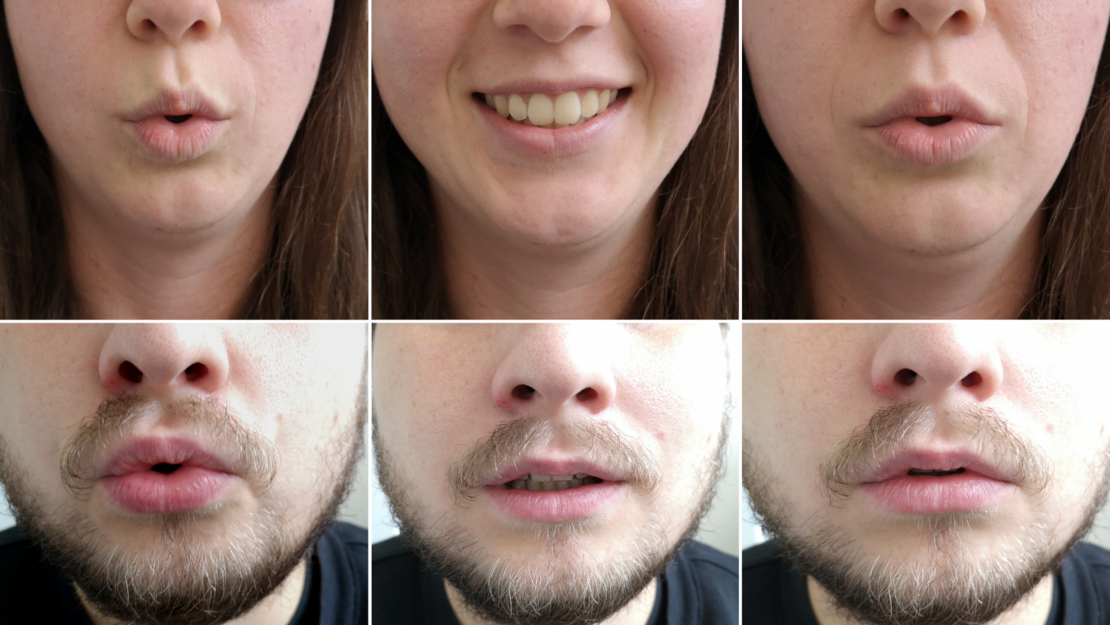Experiment shows how vowels convey emotions
 Image: University of Kassel.
Image: University of Kassel.Words that are articulated with a long “ee” (in IPA, /i/) are perceived as more appropriate for describing positive objects than words containing the vowel "o" (in IPA, /o/). This much was already known from a precursor study also conducted at the University of Kassel. A recently published paper in the prestigious Journal of Experimental Psychology: General by Dr. Anita Körner and Prof. Ralf Rummer found that the emotional evaluation of speech sounds is caused by vowel articulation and not the pitch of vowels.
When the sound "ee" is articulated, facial muscles that are also required for smiling are contracted, pulling up the corners of the mouth. Photographers, for example, also use this when asking you to say "cheese." Saying "o" on the other hand, employs antagonistic muscles and thus prevents smiling.
The present study tested the valence of the vowels "ee" and "o" and also examined the vowel "ü" (as in the French tu, in IPA, /y/), because "ü" has interesting properties. The tensing of facial muscles when speaking "ü" is similar to "o" (and “u”) - employing rounded lips, which prevents smiling. Thus, according to articulatory mechanisms, the vowel "ü" should be evaluated more negatively than "ee" (and similar to “o”). In terms of pitch, however, the "ü" is similar to the "ee". According to the theory that higher pitch elicits positive emotions, words with "ü" would be associated with more positive feelings than words with "o".
In the Kassel study, German-speaking subjects assessed the possible meaning of pseudo-words containing either "ee," "o," or "ü". First, they were asked to read words and to imagine that these words were from a foreign language. Their task was to guess at these words’ possible meaning, from denoting rather positive to rather negative things. The result was that words with "ee" were more often assigned to positive things than words with "o" and words with "ü". Later experiment took a more subtle approach; participants were asked to assign made-up names to faces. Participants more often assigned people with positive facial expressions (Experiment 2) and with likable faces (Experiments 3 & 4) to pseudo-names with the vowel "ee" than to names with the vowels "o" or "ü". A final experiment, in which participants heard instead of read the pseudo-names, yielded the same result. Thus, all experiments confirm that the valence of vowels is significantly influenced by facial expression during speech instead of pitch.
"In the course of individual and language-historical development, these different sounds have apparently become linked to positive or negative emotions," explains Prof. Rummer. In a study from 2019, he was already able to show that the emotional properties of an object influence which vowels participants use when inventing new words. For positive things, new words frequently contained the vowel "ee", while names for negative things, more often contained the vowel "o". Traces of this principle can still be found in the vocabulary of several languages. Rummer suspects that the same mechanism underlies other languages as well.
Dr. Ralf Rummer is professor of Cognitive Psychology at the University of Kassel. His research focuses on psychology of language, memory, and learning. Dr. Anita Körner is a PostDoc in the Department of Cognitive Psychology and conducts research on language and morality.
publication:
Körner, A., & Rummer, R. (2021). Articulation contributes to valence sound symbolism.Journal of Experimental Psychology: General. DOI: 10.1037/xge0001124
Contact:
Dr. Anita Körner
Universität Kassel
Fachgebiet Allgemeine Psychologie
Tel.: 0561 804-3582
E-Mail: anita.koerner[at]uni-kassel[dot]de
Prof. Dr. Ralf Rummer
Universität Kassel
Fachgebiet Allgemeine Psychologie
Tel.: 0561 804- 3592
E-Mail: rummer[at]uni-kassel[dot]de
Press contact:
Sebastian Mense
Universität Kassel
Kommunikation, Presse- und Öffentlichkeitsarbeit
Phone: +49 561 804-1961
E-Mail: presse[at]uni-kassel[dot]de